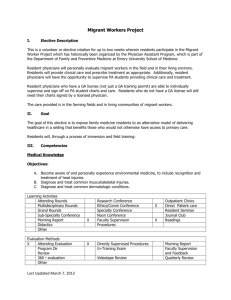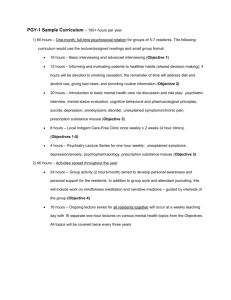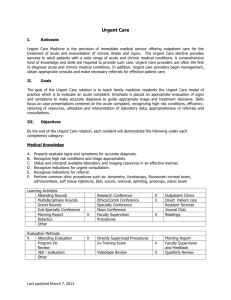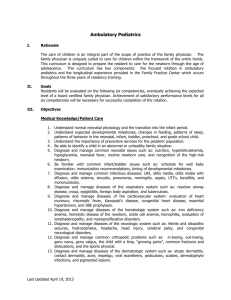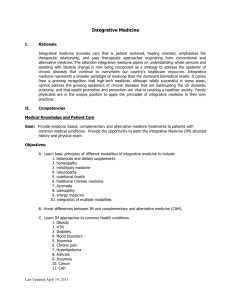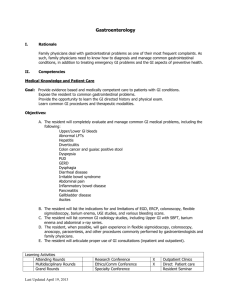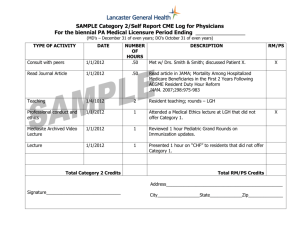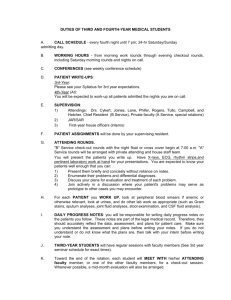Preventive Cardiology Medical Subspecialty
advertisement
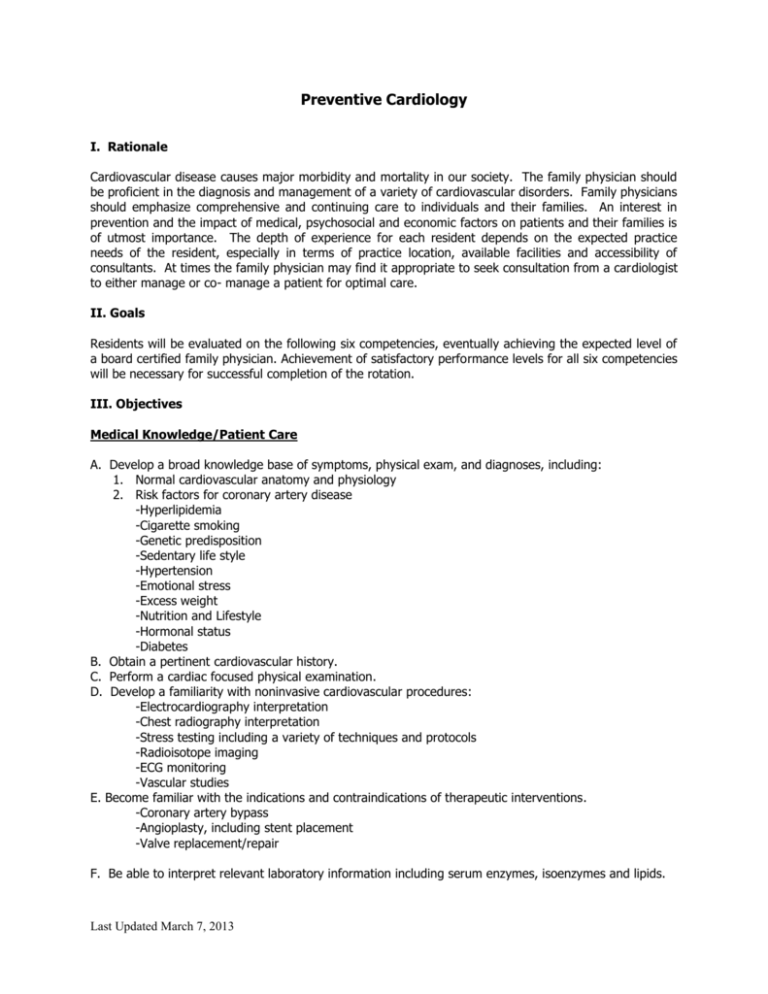
Preventive Cardiology I. Rationale Cardiovascular disease causes major morbidity and mortality in our society. The family physician should be proficient in the diagnosis and management of a variety of cardiovascular disorders. Family physicians should emphasize comprehensive and continuing care to individuals and their families. An interest in prevention and the impact of medical, psychosocial and economic factors on patients and their families is of utmost importance. The depth of experience for each resident depends on the expected practice needs of the resident, especially in terms of practice location, available facilities and accessibility of consultants. At times the family physician may find it appropriate to seek consultation from a cardiologist to either manage or co- manage a patient for optimal care. II. Goals Residents will be evaluated on the following six competencies, eventually achieving the expected level of a board certified family physician. Achievement of satisfactory performance levels for all six competencies will be necessary for successful completion of the rotation. III. Objectives Medical Knowledge/Patient Care A. Develop a broad knowledge base of symptoms, physical exam, and diagnoses, including: 1. Normal cardiovascular anatomy and physiology 2. Risk factors for coronary artery disease -Hyperlipidemia -Cigarette smoking -Genetic predisposition -Sedentary life style -Hypertension -Emotional stress -Excess weight -Nutrition and Lifestyle -Hormonal status -Diabetes B. Obtain a pertinent cardiovascular history. C. Perform a cardiac focused physical examination. D. Develop a familiarity with noninvasive cardiovascular procedures: -Electrocardiography interpretation -Chest radiography interpretation -Stress testing including a variety of techniques and protocols -Radioisotope imaging -ECG monitoring -Vascular studies E. Become familiar with the indications and contraindications of therapeutic interventions. -Coronary artery bypass -Angioplasty, including stent placement -Valve replacement/repair F. Be able to interpret relevant laboratory information including serum enzymes, isoenzymes and lipids. Last Updated March 7, 2013 G. Learn incorporation of health promotion and disease prevention into patient care. The resident should develop attitudes that encompass: 1. Awareness of the importance of physician and patient working as partners to promote optimal cardiovascular health. 2. A compassionate approach to the care of patients with cardiac disease, especially those with chronic disease. 3. Recognize the psychosocial and economic impact of cardiovascular disease on the individual and family. 4. Support of the individual, and family through consultation, evaluation, treatment and rehabilitation. H. Learn comprehensive elements of the cardiac management, treatment and rehabilitation of: 1. Congestive Heart Failure 2. Diastolic dysfunction 3. Hypertension 4. Angina I. Become familiar with the psychological issues of cardiovascular medicine including: 1. Sexual function/dysfunction 2. Depression 3. Family dynamics Learning Activities Attending Rounds Multidisciplinary Rounds Grand Rounds Sub-Specialty Conference Morning Report X Didactics Other Evaluation Methods X Attending Evaluation X Program Director Review 360 ᵒ evaluation Other X X X Research Conference Ethics/Comm Conference Specialty Conference Noon Conference Faculty Supervision Procedures X X Directly Supervised Procedures In-Training Exam X X Videotape Review X X Outpatient Clinics Direct Patient care Resident Seminar Journal Club Readings Morning Report Faculty Supervision and Feedback Quarterly Review Professionalism Residents must demonstrate a commitment to carrying out professional responsibilities, adherence to ethical principles, and sensitivity to a diverse patient population. Residents are expected to: A. Demonstrate respect, compassion, and integrity; a responsiveness to the needs of patients and society that supersedes self-interest; accountability to patients, society, and the profession; and a commitment to excellence and on-going professional development. B. Demonstrate a commitment to ethical principles pertaining to provision or withholding of clinical care, confidentiality of patient information, informed consent, and business practices. C. Demonstrate sensitivity and responsiveness to patients' culture, age, gender, and disabilities. D. Arrive at the rotation in a timely fashion. E. Work effectively as a member of a team. F. Respect patient privacy by guarding medical records and discussion of personal information about patients. Last Updated March 7, 2013 G. Assist patients and their families in planning for future care needs and care decisions based on prognosis for the disease. H. Support the patient in their healthcare decisions. I. Demonstrate professional, respectful demeanor when addressing team members, patients, ancillary staff, and consultants. J. Appear professionally dressed and well groomed. K. Completes clinic notes in a timely fashion. L. Attends required conferences. M. Responds to pages in a timely fashion. Learning Activities Attending Rounds Multidisciplinary Rounds Grand Rounds Sub-Specialty Conference Morning Report Didactics Other X Evaluation Methods X Attending Evaluation X Program Director Review 360 ᵒ evaluation Other Research Conference Ethics/Comm Conference Specialty Conference Noon Conference Faculty Supervision Procedures X X Outpatient Clinics Direct Patient care Resident Seminar Journal Club Readings Directly Supervised Procedures In-Training Exam X X Videotape Review X Morning Report Faculty Supervision and Feedback Quarterly Review Practice-based Learning and Improvement Residents must be able to investigate and evaluate their patient care practices, appraise and assimilate scientific evidence, and improve their patient care practices. Residents are expected to: A. Analyze practice experience and perform practice-based improvement activities using a systematic methodology. B. Locate, appraise, and assimilate evidence from scientific studies related to their patients' health problems. C. Obtain and use information about their own population of patients and the larger population from which their patients are drawn. D. Apply knowledge of study designs and statistical methods to the appraisal of clinical studies and other information on diagnostic and therapeutic effectiveness. E. Use information technology to manage information, access on-line medical information; and support their own education. G. Learn to incorporate health promotion and disease prevention into patient care. H. Use evidence-based medicine, evaluation of available evidence, and use of best-available evidence at morning report meetings and during routine clinical care. Learning Activities Attending Rounds Multidisciplinary Rounds Grand Rounds Sub-Specialty Conference Morning Report Last Updated March 7, 2013 X Research Conference Ethics/Comm Conference Specialty Conference Noon Conference Faculty Supervision X X Outpatient Clinics Direct Patient care Resident Seminar Journal Club Readings Didactics Other Evaluation Methods X Attending Evaluation X Program Director Review 360 ᵒ evaluation Other Procedures Directly Supervised Procedures In-Training Exam X X Videotape Review X Morning Report Faculty Supervision and Feedback Quarterly Review Interpersonal and Communication Skills Residents must be able to demonstrate interpersonal and communication skills that result in effective information exchange and teaming with patients, their patients families, and professional associates. Residents are expected to: A. Develop skills for interviewing patients that allow accurate, complete collection of information regarding symptoms, and the community environment that affect the patients cardiovascular health. B. Develop skills in communicating results, educating patients and their families, and dealing with sensitive issues for patients and families, and negotiating a plan of treatment with the patient and family. C. Residents will understand the need for a multidisciplinary, integrated approach to cardiac prevention and rehabilitation including: nutritionists, behavioral scientists, exercise physiologists, educators, cardiologists, and family physicians. D. Develop patient sensitive skills for interviewing that allow accurate, and complete collection of information regarding symptoms, the family and the community that affect the patient's health and care. E. Develop skills in communicating results to patients, their families, other health care providers. F. Develop skills in educating patients and their families, in dealing with sensitive issues for patients and families, and in negotiating a plan of investigation and treatment with the patient and family. G. Develop professional relationships with co-workers, consultants, ancillary staff and other Professionals to enable assembling of health care teams and mobilization of community resources to optimize care of the patient. H. Develop an understanding of the role of the family medicine consultant, and is able to support the patient through the process of consultation, medical evaluation, treatment, rehabilitation and long-term care. J. Use professional language and demeanor when communicating with other residents, with Family Medicine attending physicians, with physicians from other services, with nonphysician clinical staff, with non-physician non-clinical staff, and with patients and their families. K. Create and sustain a therapeutic and ethically sound relationship with patients. L. Use effective listening skills and elicit and provide information using effective nonverbal, explanatory, questioning, and writing skills. M. Work effectively with others as a member or leader of a health care team or other professional group. N. Improve skills for providing patient education regarding prevention of cardiovascular disease associated with other medical conditions. Last Updated March 7, 2013 Learning Activities Attending Rounds Multidisciplinary Rounds Grand Rounds Sub-Specialty Conference Morning Report Didactics Other Evaluation Methods X Attending Evaluation X Program Director Review 360 ᵒ evaluation Other X X X Research Conference Ethics/Comm Conference Specialty Conference Noon Conference Faculty Supervision Procedures X X X Directly Supervised Procedures In-Training Exam X Videotape Review X Outpatient Clinics Direct Patient care Resident Seminar Journal Club Readings Morning Report Faculty Supervision and Feedback Quarterly Review Systems-based Practice Residents must demonstrate an awareness of and responsiveness to the larger context and system of health care and the ability to effectively call on system resources to provide care that is of optimal value. Residents are expected to: A. Understand how their patient care and other professional practices affect other health care professionals, the health care organization, and the larger society and how these elements of the system affect their own practice. B. Know how types of medical practice and delivery systems differ from one another, including methods of controlling health care costs and allocating resources. C. Practice cost-effective health care and resource allocation that does not compromise quality of care. D. Advocate for quality patient care and assist patients in dealing with system complexities. E. Know how to partner with health care managers and health care providers to assess, coordinate, and improve health care and know how these activities can affect system performance. F. Learn the appropriate documentation, coding, and billing for cardiology consults, procedures, and patient education. G. Thoroughly document the plan for patient care management in the medical record. H. Learn what constitutes an appropriate cardiology consult, including the formulation of a specific clinical question for the consultant. I. Become knowledgeable about prevention strategies for preventing cardiovascular sequelae. Learning Activities Attending Rounds Multidisciplinary Rounds Grand Rounds Sub-Specialty Conference Morning Report Didactics Other Evaluation Methods X Attending Evaluation X Program Dir Last Updated March 7, 2013 X X X Research Conference Ethics/Comm Conference Specialty Conference Noon Conference Faculty Supervision Procedures Directly Supervised Procedures In-Training Exam X X X Outpatient Clinics Direct Patient care Resident Seminar Journal Club Readings X Morning Report Faculty Supervision Review 360 ᵒ evaluation Other IV. Videotape Review X and Feedback Quarterly Review Instructional Strategies (see above) This is a four-week rotation and should be attended by the resident for a minimum of 5-6 half days per week. The other 4-5 half days per week will be spent in the resident’s continuity clinic and in didactics. Readings can be obtained from Section VI and should also be solicited from the Preventive Cardiology attending and team. The resident should assess and manage patients on the service and should actively participate in case discussions. Outpatient care of cardiac conditions will occur longitudinally in the resident’s continuity clinic. V. Evaluation Strategies (see above) A. B. C. Observation of the resident by the Preventive Cardiology attending. Procedure/diagnosis documentation by the resident. End of rotation evaluation. VI. Implementation Methods This medical subspecialty consists of 6 ½ day sessions per week of preventive cardiology in a clinical setting at Emory University School of Medicine, for a total of 4 weeks. This Medical Subspecialty will be under the supervision of Dr. Larry Sperling, Department of Cardiology, Emory University School of Medicine. Location: Laurence Sperling, MD The Emory Clinic 1525 Clifton Road, Suite 208 Atlanta, GA 30322 Contact: 404-778-2898 ofc 404-778-2835 fax Family Practice Center: 5 ½ days per week in the Family Medicine Clinic, 4 ½ days in the Preventive Cardiology Clinic. Call/Vacation: Call will be with the FMS @ Emory Midtown Hospital. Vacation is permitted. Supervision: Residents will be supervised by a cardiology attending. Residents should document all procedures in their residency passport. Conferences: The resident is expected to attend Family Medicine Didactics Conferences. VII. Suggested Readings/Resources AFP Monographs Coronary Artery Disease (Dec 2007) #343 Heart Failure Update (Aug 2009) #363 Hypertension in Special Populations (May 2009) #360 Last Updated March 7, 2013

